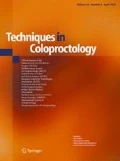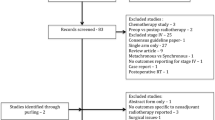Abstract
Background
An organ-preserving strategy may be a valid alternative in the treatment of selected patients with rectal cancer after neoadjuvant radiotherapy. Preoperative assessment of the risk for tumor recurrence is a key component of surgical planning. The aim of the present study was to increase the current knowledge on the risk factors for tumor recurrence.
Methods
The present study included individual participant data of published studies on rectal cancer surgery. The literature was reviewed according to according to Preferred Reporting Items for Systematic Reviews and Meta-Analyses of Individual Participant Data checklist (PRISMA-IPD) guidelines. Series of patients, whose data were collected prospectively, having neoadjuvant radiotherapy followed by transanal local excision for rectal cancer were reviewed. Three independent series of univariate/multivariate binary logistic regression models were estimated for the risk of local, systemic and overall recurrence, respectively.
Results
We identified 15 studies, and 7 centers provided individual data on 517 patients. The multivariate analysis showed higher local and overall recurrences for ypT3 stage (OR 4.79; 95% CI 2.25–10.16 and OR 6.43 95% CI 3.33–12.42), tumor size after radiotherapy > 10 mm (OR 5.86 95% CI 2.33–14.74 and OR 3.14 95% CI 1.68–5.87), and lack of combined chemotherapy (OR 3.68 95% CI 1.78–7.62 and OR 2.09 95% CI 1.10–3.97), while ypT3 was the only factor correlated with systemic recurrence (OR 5.93). The analysis of survival curves shows that the overall survival is associated with ypT and not with cT.
Conclusions
Local excision should be offered with caution after neoadjuvant chemoradiotherapy to selected patients with rectal cancers, who achieved a good response to neoadjuvant chemoradiotherapy.







Similar content being viewed by others
Data availability
The datasets analysed during the current study are available from the corresponding author on reasonable request.
References
Vennix S, Pelzers L, Bouvy N et al (2014) Laparoscopic versus open total mesorectal excision for rectal cancer. Cochrane Database Syst Rev 4:CD005200
Habr-Gama A, Sao Juliao GP, Perez RO (2015) Nonoperative management of rectal cancer: identifying the ideal patients. Hematol Oncol Clin N Am 29:135–151
Smith FM, Waldron D, Winter DC (2010) Rectum-conserving surgery in the era of chemoradiotherapy. Br J Surg 97:1752–1764
Stewart LA, Clarke M, Rovers M, PRISMA-IPD Development Group et al (2015) Preferred reporting items for systematic review and meta-analyses of individual participant data: the PRISMA-IPD statement. JAMA 313:1657–1665
Agenzia Italia del Farmaco (2008) Linee guida per la classificazione e la conduzione degli studi osservazionali sui farmaci. Roma
Development Core Team (2008) A language and environment for statistical computing. Foundation for Statistical Computing, Vienna, Austria. ISBN 3-900051-07-0. http://www.R-project.org. Accessed 1 Feb 2019
Guerrieri M, Gesuita R, Ghiselli R et al (2014) Treatment of rectal cancer by transanal endoscopic microsurgery: experience with 425 patients. World J Gastroenterol 28(20):9556–9563
Stipa F, Picchio M, Burza A et al (2014) Long-term outcome of local excision after preoperative chemoradiation for ypT0 rectal cancer. Dis Colon Rectum 57:1245–1252
Coco C, Rizzo G, Mattana C et al (2013) Transanal endoscopic microsurgery after neoadjuvant radiochemotherapy for locally advanced extraperitoneal rectal cancer: short-term morbidity and functional outcome. Surg Endosc 27:2860–2867
Arezzo A, Arolfo S, Allaix ME et al (2015) Results of neoadjuvant short-course radiation therapy followed by transanal endoscopic microsurgery for T1–T2 N0 extraperitoneal rectal cancer. Int J Radiat Oncol Biol Phys 92:299–306
Restivo A, Zorcolo L, D’Alia G et al (2016) Risk of complications and long-term functional alterations after local excision of rectal tumors with transanal endoscopic microsurgery (TEM). Int J Colorectal Dis 31:257–266
Bujko K, Richter P, Smith FM et al (2013) Preoperative radiotherapy and local excision of rectal cancer with immediate radical re-operation for poor responders: a prospective multicentre study. Radiother Oncol 106:198–205
Perez RO, Habr-Gama A, Sao Juliao GP et al (2016) Transanal endoscopic microsurgery (TEM) following neoadjuvant chemoradiation for rectal cancer: outcomes of salvage resection for local recurrence. Ann Surg Oncol 23:1143–1148
Lezoche E, Baldarelli M, Lezoche G et al (2012) Randomized clinical trial of endoluminal locoregional resection versus laparoscopic total mesorectal excision for T2 rectal cancer after neoadjuvant therapy. Br J Surg 99:1211–1218
Garcia-Aguilar J, Renfro LA, Chow OS et al (2015) Organ preservation for clinical T2N0 distal rectal cancer using neoadjuvant chemoradiotherapy and local excision (ACOSOG Z6041): results of an open-label, single-arm, multi-institutional, phase 2 trial. Lancet Oncol 16:1537–1546
Lezoche G, Baldarelli M, Guerrieri M et al (2008) A prospective randomized study with a 5-year minimum follow-up evaluation of transanal endoscopic microsurgery versus laparoscopic total mesorectal excision after neoadjuvant therapy. Surg Endosc 22:352–358
Cutting JE, Hallam SE, Thomas MG, Messenger DE (2018) A systematic review of local excision followed by adjuvant therapy in early rectal cancer: are pT1 tumors the limit? Colorectal Dis 20:854–863
Perez RO, Habr-Gama A, Sao Juliao GP et al (2011) Transanal endoscopic microsurgery for residual rectal cancer after neoadjuvant chemoradiation therapy is associated with significant immediate pain and hospital readmission rates. Dis Colon Rectum 54:545–551
Marks JH, Valsdottir EB, DeNittis A et al (2009) Transanal endoscopic microsurgery for the treatment of rectal cancer: comparison of wound complication rates with and without neoadjuvant radiation therapy. Surg Endosc 23:1081–1087
Rullier E, Rouanet P, Tuech JJ et al (2017) Organ preservation for rectal cancer (GRECCAR 2): a prospective, randomised, open-label, multicentre, phase 3 trial. Lancet 390:469–479
Garcia-Aguilar J, Renfro LA, Chow OS et al (2015) Organ preservation for clinical T2N0 distal rectal cancer using neoadjuvant chemoradiotherapy and local excision (ACOSOG Z6041): results of an open-label, single-arm, multi-institutional, phase 2 trial. Lancet Oncol 16(15):1537–1546
Pucciarelli S, De Paoli A, Guerrieri M et al (2013) Local excision after preoperative chemoradiotherapy for rectal cancer: results of a multicenter phase II clinical trial. Dis Colon Rectum 56(12):1349–1356
Bach SP, Hill J, Monson JR et al (2009) A predictive model for local recurrence after transanal endoscopic microsurgery for rectal cancer. Br J Surg 96:280–290
Acknowledgements
We wish to thank Nicoletta Colombi who helped us with search strategy and literature selection, without whose contribution this study would not have been possible.
Author information
Authors and Affiliations
Corresponding author
Ethics declarations
Conflict of interest
The author(s) declare that they have no competing interests.
Ethical approval
All procedures performed in studies involving human participants were in accordance with the ethical standards of the institutional and national research committee and with the 1964 Helsinki declaration and its later amendments or comparable ethical standards.
Informed consent
Informed consent was obtained from the patient included in the case report.
Additional information
Publisher's Note
Springer Nature remains neutral with regard to jurisdictional claims in published maps and institutional affiliations.
Rights and permissions
About this article
Cite this article
Arezzo, A., Lo Secco, G., Passera, R. et al. Individual participant data pooled-analysis of risk factors for recurrence after neoadjuvant radiotherapy and transanal local excision of rectal cancer: the PARTTLE study. Tech Coloproctol 23, 831–842 (2019). https://doi.org/10.1007/s10151-019-02049-z
Received:
Accepted:
Published:
Issue Date:
DOI: https://doi.org/10.1007/s10151-019-02049-z




